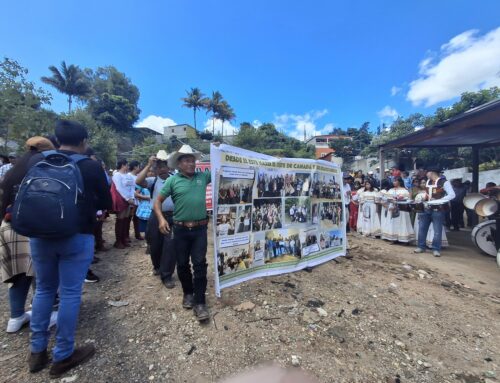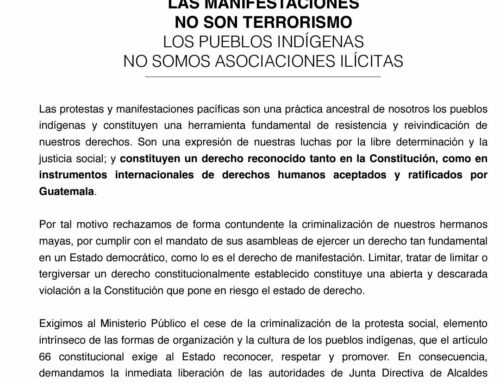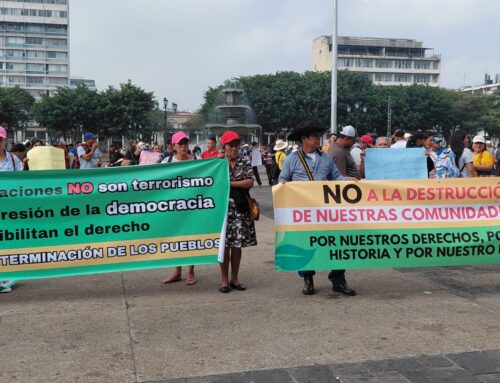THE WESTERN PEOPLE’S COUNCIL
“In defense of LIFE and territory”
POLITICAL STATEMENT IN MARK OF OXLAJUJ B’AK’TUN
(Original in Spanish here)
Authorities of the Maya People of Western Guatemala, joined together as the Council, declare:
Oxlajuj B’ak’tun is the time to strengthen ancestral wisdom and the practice and never-ending search for balance; it’s a moment in which we must transcend, raise the consciousness of human beings and recognize ourselves as such in order to reach a collective understanding. This means we must ensure that human beings be “truly human in balance with the cosmos and Mother Earth”, through interweaving and respect between cultures and the valuing of identity in every community. Lacking this, the link between the individual and their own reality is already impossible.
It is offensive for the Maya people to see the economic power and government institutions promote the FOLKLORIZATION of Oxlajuj B’ak’tun, commodifying this important event, creating a political image out of tourist promotion and the presentation of spectacles, in a way that does not appropriately interpret the Maya cosmovision.
It is shameful on the part of the Guatemalan government to make the international community believe it is promoting the Maya culture, when it continues to develop an aggressive policy of appropriation of our natural resources. This manifests itself in hundreds of concessions and imposed mining projects, hydroelectric dams, oil extraction, monoculture crops for transnational companies, all in the name of false development as a method of domination and racism in Guatemala.
In exercising of our collective rights as regulated by the ILO Convention 169 and the Declaration by the United Nations on the Rights of the Indigenous Peoples, the response of the state has been the criminalization of social struggles and repression against our communities and leaders.
The attacks against our communities includes May 1st in Santa Cruz Barillas, the massacre on October 4th in Totonicapán, which obligate us to continue our process of reforming and strengthening our own authorities and institutions. We will continue to promote the correct application of the norms and principals regulated by the ILO Convention 169 and the Declaration by the United Nations on the Rights of the Indigenous Peoples. At the start of this new era, native peoples should move from submission to effective participation as historic political actors.
The Presidential reform to the Constitution of the Republic and reforms to the mining law and laws governing teacher education, are initiatives by the government that do not favor our communities. Instead, they represent setbacks to the victories of social struggles because they are meant to consolidate the economic model of accumulation based on agro-business; mining, oil, and hydroelectric exploitation and the privatization of public services, only benefiting a limited number of families who have historically exploited and repressed our communities.
Therefore, we resort to our principals and ancestral ways of making decisions, and, in Council we agree upon the following:
To call on all Maya nations and peoples that coexist in Guatemala, to exercise our right to free determination, through the reconstruction and strengthening of our nationalities and Peoples, to construct a political and social order based on relationships of understanding and mutual respect; and, an economic model based on the principals, values, and practices of our cosmovision.
To no longer permit the use of our symbols to name military and police operations, much less to name projects that attack our harmony and communities’ life; we commit to restore our ancestral political centers in order to develop the next generation’s political thought.
1. To articulately promote political and legal processes which demand of the Government the effective implementation of the ILO Convention 169 and the Declaration by the United Nations on the Rights of the Indigenous Peoples, in all national legislation.
2. Our acknowledgement of the world’s ancestral civilizations that have left their mark on history and the chronology of time and should be part of our inspiration and aspirations to transform political and social relations.
3. To the scientists of the world, who should look to the past and to the present because the ancestral legacies continue to be relevant. We call on all to not use the cycles of time marked by our calendar in a subjective, or apocalyptic way.






Leave A Comment